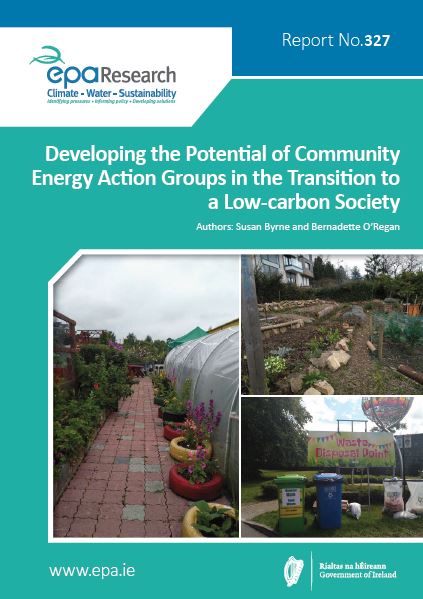Authors: Susan Byrne and Bernadette O’Regan
Summary: In Ireland, approximately 38% of the population live in rural regions. Rural populations contribute significantly more to carbon dioxide equivalent emissions in the transport and residential energy sectors than their urban counterparts. In relation to community sustainability, this report evaluates the opportunities for rural communities in low-carbon transition in relation to energy, waste, transport and other contributing factors.

The transition to a low carbon and sustainable economy and society will require effective public engagement and acceptance. Many Irish community-based groups have been working towards addressing climate change through actions to enhance sustainability at a local scale. There is a perceived lack of agency support including in relation to communication, knowledge sharing and technical guidance for implementation and monitoring. This often results in community groups feeling isolated and having a poor understanding of the real-world impact of their efforts in mitigating environmental challenges. Pressures include the lack of clear guidelines, resources such as indicators and measurement tools, and dedicated support agencies.
Following the criteria adopted in this study, screening of communities identified only six communities that were engaged in implementation of a holistic plan for sustainability, with most focusing on gaining grants for enhancing energy efficiency.
Managing a community-scale low carbon transition involves more than the adoption of renewable energy and energy efficiency actions. Transition requires changes to local amenities, local industry, local food, and education and outreach activities.
This research identified access to funding as a major barrier to implementation of more ambitious projects at the community scale. Experience in other European Union (EU) states clearly shows that in many instances the optimal way for communities to gain the long-term funding necessary for ambitious actions is by selling renewable energy into the national grid at a tariff greater than that currently available in Ireland.
The benefits to communities and their economies can occur where this income is invested in the local economy to increase regional added value, thus enabling communities to implement further decarbonisation actions. External agencies provide crucial support in creating community cohesion. In the EU, higher education institutes and local authorities are often successful in providing this support. Including the wider public in the community decision-making process, and also ensuring that they share in the social and financial benefits, was found to be essential. Inclusion of the wider public is required if community-scale action is to enhance national-scale decarbonisation action.
The research strongly demonstrates that an effective pathway towards a low carbon transition can be achieved at the community scale given supporting policy and funding structures. Examples from two German communities showed the potential of local actors to identify, and to act on, locally relevant sustainability issues. Additional policy and funding structures that enable community groups to develop and advance their low carbon transition projects are required if Irish community groups are to replicate the successes of communities in other EU countries in achieving significant greenhouse gas emissions reductions, and thus work to create models of more sustainable living, and help meet national targets.
With regard to acknowledging the contribution that Irish community groups make to national low carbon transition, it is important that the greenhouse gas emissions reductions achieved through locally initiated projects are measured, recognised and rewarded where appropriate. The impact of decarbonisation actions are not limited to energy and emissions reductions, but also include a wide range of both economic and environmental benefits. In this report, a template toolkit and guidance manual to support action at the community scale are presented.
https://www.epa.ie/media/epa-2020/publications/research/Research-327-thumbnail.JPG